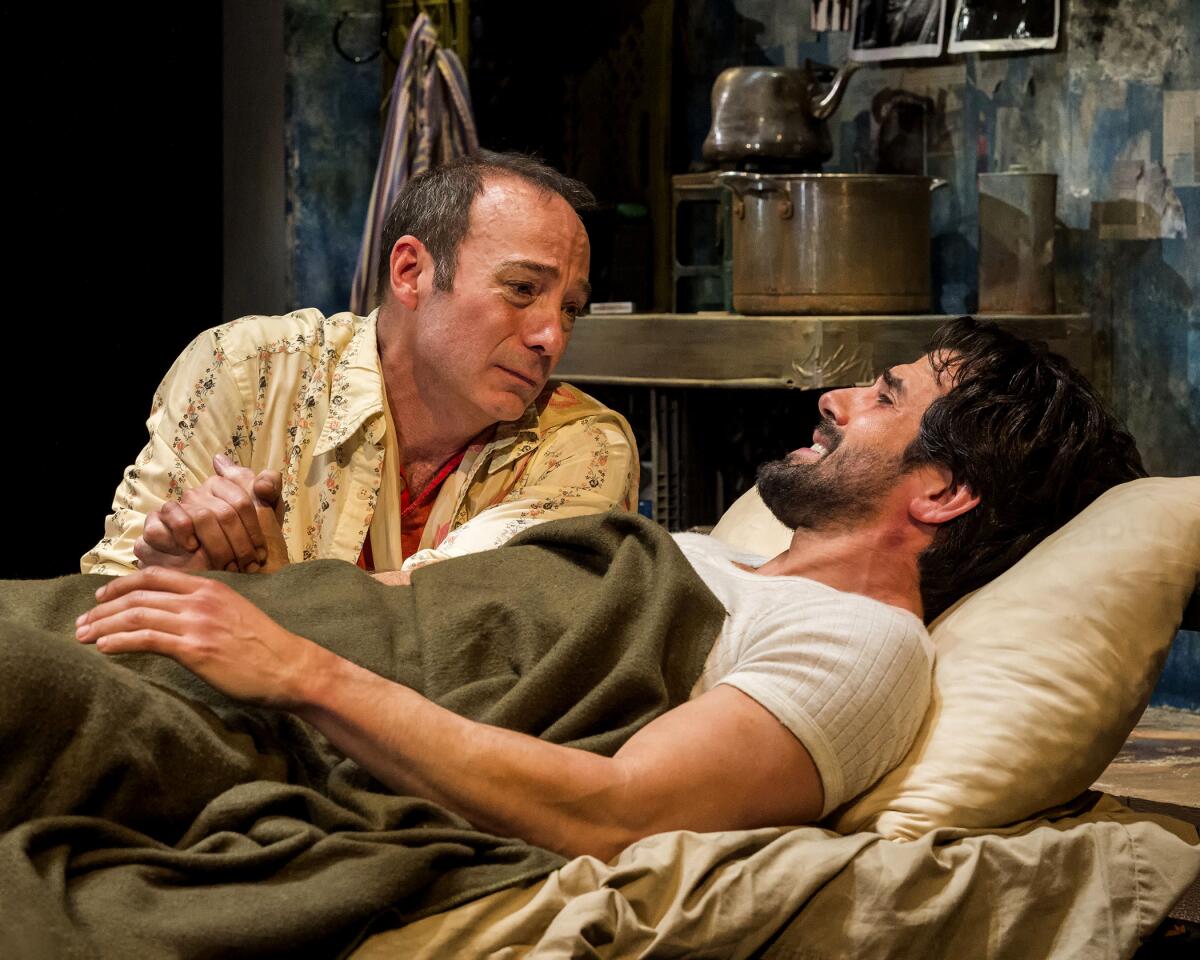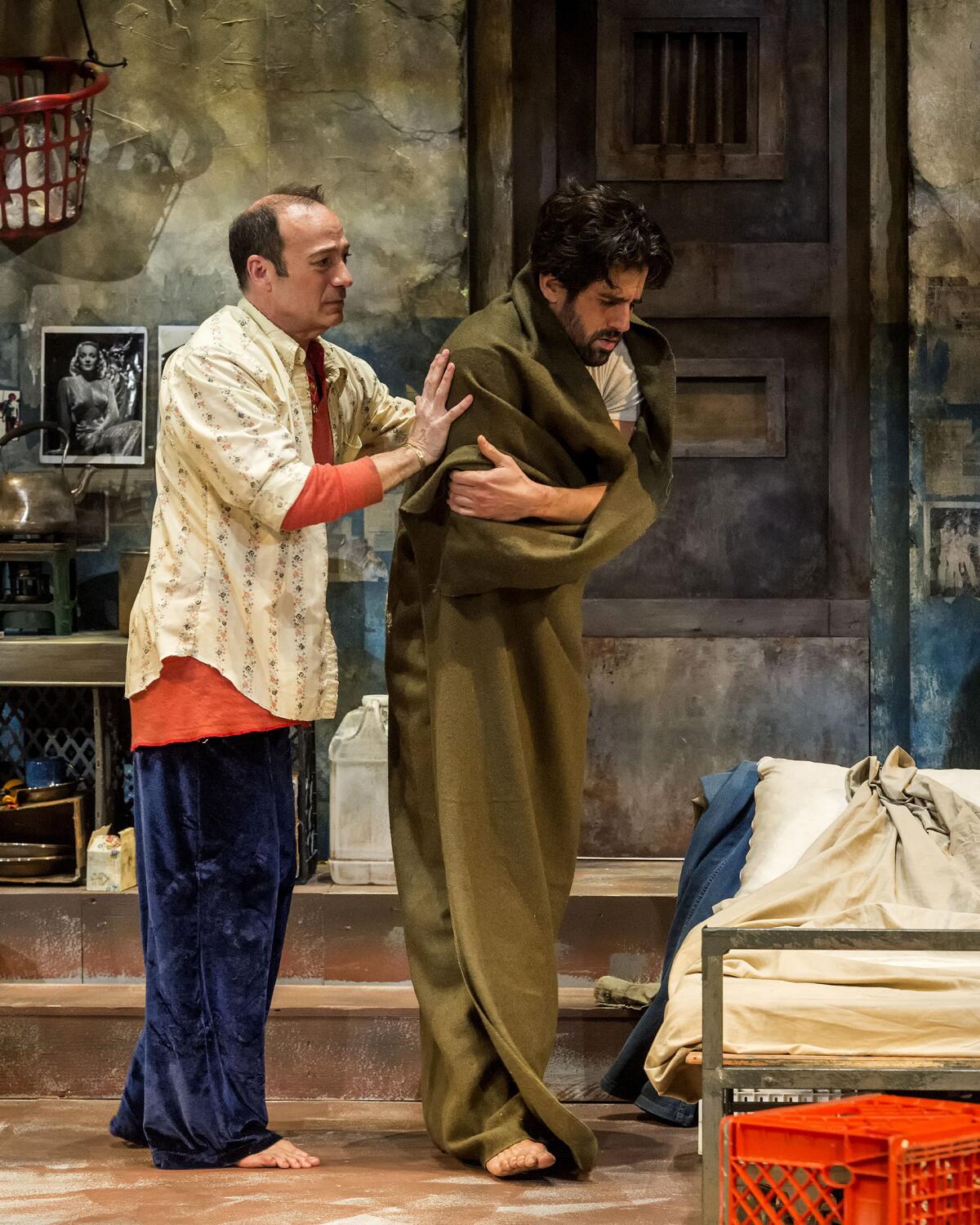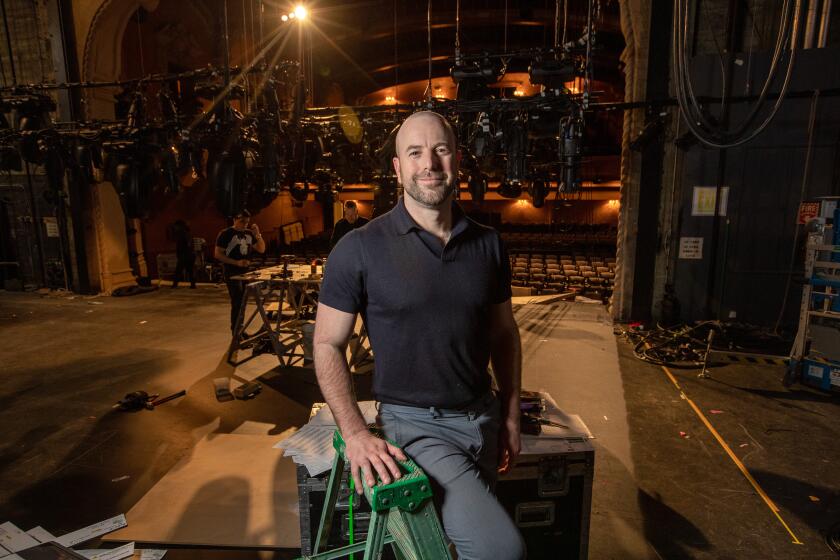Review: A potent and intimate take on ‘Kiss of the Spider Woman’ enthralls at A Noise Within

- Share via
Manuel Puig’s “Kiss of the Spider Woman” is perhaps best known in the U.S. as the film that won William Hurt an Oscar for flouncing around a prison cell in a kimono.
But this 1985 movie sprang from a 1976 novel. And that novel also gave rise to a play, which the Argentine author adapted himself. A musical was subsequently spawned, offering more proof of the material’s imaginative hold.
The drama, a two-character work, strips the story to its essence. The actors must supply all the narrative magic through the contact they make with each other on stage.
On one level, the play is about political prisoners. But on another, it is about something more universal — the human need for companionship, understanding and love. For mutuality as well as for dignity and respect.
The spell cast by the revival of “Kiss of the Spider Woman” at A Noise Within in Pasadena doesn’t shoot many sparks early on. But the production, directed by Michael Michetti, builds in potency, ultimately ensnaring its audience in the time-tested tale.
Set in a Buenos Aires prison, the drama sets up a political odd couple. Molina (Ed F. Martin), a gay window dresser arrested on a morals charge, escapes harsh reality through the fantasy of movies. Valentin (Adrián González), a straight Marxist, thinks only of his revolutionary mission.
Pasadena Playhouse’s producing artistic director, Danny Feldman, has proved that growth is still possible in a time of spiraling crisis for American theater.
The men could hardly be more different, but a repressive political regime makes for strange bedfellows.
Molina struts and frets like a South American Blanche DuBois, albeit one with a maternal streak. He shares his food with Valentin, fussing over his cellmate and tending to him when he’s sick.
Valentin grows impatient with Molina’s frivolity, his fundamental lack of seriousness. And he loathes what he perceives as homosexual abjection. But he can’t help responding to Molina’s kindness and generosity.
A curious tenderness develops between the cellmates, who begin to take in the humanity of each other that their society has denied. Living side by side in confinement, they come to depend on each other for psychological sustenance. Their unexpected friendship expands their identities and chips away at the stereotypes that have been cruelly imposed on them.
Valentin rolls his eyes at Molina’s romanticism, though slowly but surely he begins to acknowledge a place in his ideology for love. What’s more, his tightly wound masculinity begins to loosen as he sees the effect of an oppressive system on someone he comes to care about deeply.

Molina, who’s caught up in a prison conspiracy, has the opportunity to discover what matters to him beyond the creature comforts he has relied on to dull the pain of his existence. He may adopt a craven facade, but there’s courage waiting to be tapped.
Under Michetti’s direction, the actors are permitted to make the characters their own. Martin doesn’t overplay Molina’s flamboyance. He minces, but modestly. His Molina knows how dangerous it is to call undue attention to himself, even as he makes no effort to conform to traditional gender expectations.
González endows Valentin with a modern masculinity. The character’s machismo flares up, but there’s an enlightened compassion that’s never out of sight.
To entertain Valentin, Molina fancifully retells the plot of Val Lewton’s 1942 film “Cat People.” He’s spinning a plot to pique Valentin’s interest, but these moments are bloodless onstage. Martin has trouble bringing the movie to life, and González’s excitement can’t help seeming pushed.
The production is more vivid when the actors are interacting with the tangible objects of the prison cell, which is artfully arrayed by scenic designer Tesshi Nakagawa. The set, strategically situated to enhance the audience’s sense of proximity, is at once painterly and stark, picturesque and dingy. Jared A. Sayeg’s lighting and Robert Oriol’s sound design facilitate the shifts between claustrophobia and intimacy.
Sheets, towels, pans and cups become an extension of the dialogue. These items are precious to the characters, and the actors impart to them the necessary emotional significance.
Perhaps the most moving scene in the production is when Martin’s Molina tends to González’s Valentin, who has soiled himself after becoming violently ill. Molina assesses how he can best provide comfort and cleanliness with the supplies at hand. Valentin, utterly helpless, allows himself to be nurtured by a man.
There’s something heroic in the domestic command that Molina summons in a situation that might naturally provoke disgust. But Molina and Valentin are no longer strangers to each other. Their deepening relationship, beautifully traced on A Noise Within’s stage, turns a political hell into a provisional sanctuary.
‘Kiss of the Spider Woman’
Where: A Noise Within, 3352 E. Foothill Blvd., Pasadena
When: 7:30 p.m. Thursdays, 8 p.m. Fridays, 2 and 8 p.m. Saturdays, 2 p.m. Sundays. Ends April 23
Cost: Start at $25
Info: (626) 356-3100 or www.anoisewithin.org
Running time: 1 hour, 45 minutes
More to Read
The biggest entertainment stories
Get our big stories about Hollywood, film, television, music, arts, culture and more right in your inbox as soon as they publish.
You may occasionally receive promotional content from the Los Angeles Times.












